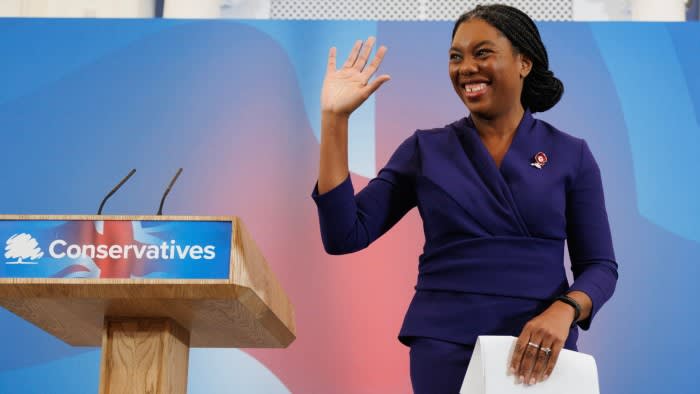Unlock the Editor’s Digest for free
Roula Khalaf, Editor of the FT, selects her favourite stories in this weekly newsletter.
In July’s UK election the Conservatives suffered, in their terms, a wipeout. Their 121 seats on 24 per cent of the vote were their worst results since the party was formally established in the 1830s. In the ensuing leadership contest, MPs put forward two rightwingers for party members to choose between. The winner, Kemi Badenoch, is a marginally more credible leader than her rival Robert Jenrick. As the party’s fourth female leader, and the first Black leader of a major UK party, she continues the Tory openness to diversity in its top ranks. But her victory marks a doubling down on the post-Brexit swerve to the right that is the root of the party’s current travails. The only road back to power is through restoring its appeal to the UK at large, not a narrow right flank.
Both candidates, in different ways, misdiagnosed the cause of the Conservative rout as being insufficiently rightwing, particularly on immigration and tax. In reality, many voters were so disenchanted with 14 years of Tory rule that they sought to dispatch the government by any means possible.
Some did opt for Nigel Farage’s right-wing Reform party. Others voted tactically for whichever non-Conservative stood the best chance in their area. That explains, in part, Labour’s whopping majority on a modest winning vote share, and the Liberal Democrats’ record 72 seats. The Tories bled support to both right and left.
In former foreign secretary James Cleverly, the party had a leadership candidate who correctly identified its problem as being seen by voters as untrustworthy, divided and barely competent. His exhortation to “be more normal” was the standout pitch at September’s party conference. MPs instead sent Badenoch and Jenrick to members. That Jenrick made the misguided fringe issue of exiting the European Convention on Human Rights a centrepiece of his programme shows how far removed he is from most voters’ real concerns.
Unlike her rival, Badenoch has not committed herself to a list of divisive policies. While she is highly ideological, her manifesto was deliberately vague. As a leader, she is not the finished article. She made a name for herself by calling out the excesses of “woke” politics, and as business secretary was prepared to defy the leadership over bad policy, scrapping Rishi Sunak’s pledge to review or revoke all retained EU law.
But she has been too ready to indulge in culture wars, and recent comments on the UK’s minimum wage, maternity pay and autistic people have appeared politically obtuse. If she is to bring together her fractious party, she will need to restrain her propensity to pick fights.
Whether Badenoch can restore the Conservatives to viability has broader ramifications. The UK system needs a strong opposition; the quality of its democracy suffers when governments are unchallenged. Badenoch’s biggest task is to develop a credible critique of the economy and public services that can hold the Labour government to account and begin to win back voters.
This should not involve attempting to outflank Reform and ape hard-right European parties on issues such as migration and climate change. The scale of Labour’s tax-raising Budget last week was arguably necessitated by the extent of Britain’s malaise. But in its return to a big state, and in putting the financial burden on business, it was distinctly “old” Labour. There is ample scope for the Conservatives to be a mainstream party of the centre right that champions entrepreneurship and stands against excessive state intervention. Above all, they need to appear to like the country they wish to govern, including middle-class professionals and city dwellers. If she is to make the Tories electable, this is the direction in which Badenoch should steer her party.
